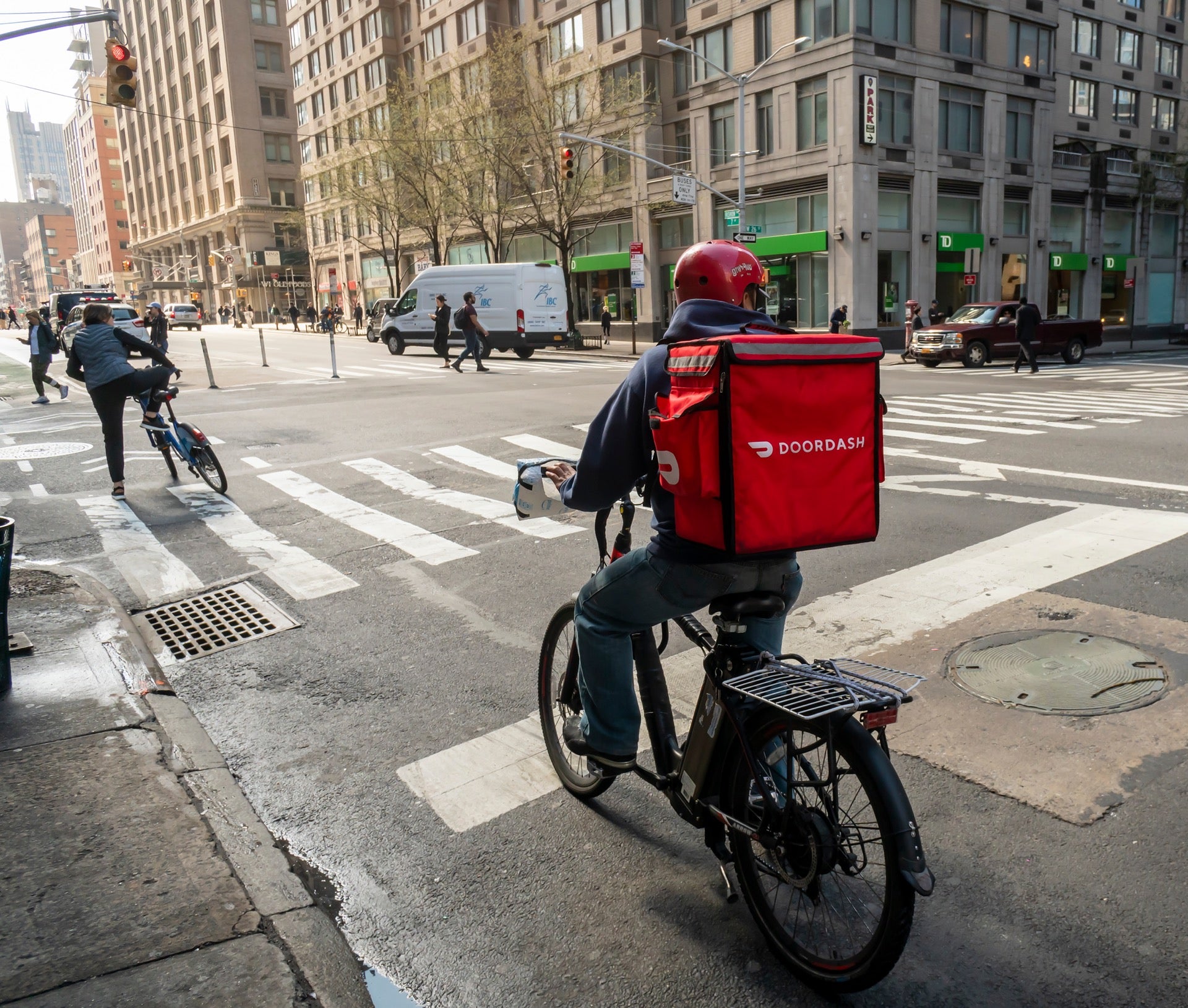
DoorDash‘s new credit card could help it ride out the end of the pandemic slump as its riders increasingly attempt to trick the app to give them better fares.
The news comes after a year that saw Doordash become one of the big winners from the Covid-19 crisis. With lockdowns forcing people to stay at home instead of enjoying visits to restaurants, the San Francisco-headquartered company enjoyed a three-fold spike in demand for its services over the course of the epidemic.
However, with the end of the pandemic in sight through the rollout of vaccination programmes and more easing of social distancing restrictions, many of its customers are expected to opt for dine-in experiences over DoorDash’s services in the future. As a result, its share price has tumbled by about 40% to $127.50 since a February trade high of $215.16 per share.
Now Doordash is reportedly looking to secure its revenue by launching its own rewards credit card. Speaking with people familiar with the matter, the Wall Street Journal has revealed that the company has already received offers from more than 10 large banks and fintech companies to issue the card.
The same report also revealed that grocery delivery firm Instacart has teamed up with JPMorgan Chase & Co to issue its own rewards credit card for frequent users of its services.
Doordash’s credit card and any remaining demand from the coronavirus crisis could enable it to strengthen customer loyalty and to attract more users.
How well do you really know your competitors?
Access the most comprehensive Company Profiles on the market, powered by GlobalData. Save hours of research. Gain competitive edge.

Thank you!
Your download email will arrive shortly
Not ready to buy yet? Download a free sample
We are confident about the unique quality of our Company Profiles. However, we want you to make the most beneficial decision for your business, so we offer a free sample that you can download by submitting the below form
By GlobalDataFor the banks looking to partner with Instacard and DoorDash to launch the credit cards, the opportunity means that they can diversify their own offering after traditional travel rewards cards fell out of favour during the pandemic. Travel rewards cards had long been seen as a secure backbone of their financials.
Earlier this month, DoorDash inked a partnership with Mastercard. The deal saw World and World Elite cardholders new to DoorDash’s subscription programme DashPass enjoy a three-month free membership, as reported by Cards International. The membership includes benefits such as unlimited free delivery fees and reduced service fees for orders over $12. All DashPass members automatically get a $5 discount on their first two orders each month when paying with a World or World Elite card.
DoorDash’s new credit card push comes as it is dealing with a courier revolt of sorts. Riders, or Dashers as they are called, are increasingly trying to trick the app’s algorithms to give them better fares for their deliveries.
A Facebook group launched in October 2019 called #DeclineNow is at the centre of the controversy and has lately grabbed headlines by encouraging Dashers to reject any delivery that doesn’t pay at least $7, more than double the regular $3 floor.
The founders of the group, Dave Levy and Nikos Kanelopoulos, came up with the idea when they noticed that when one Dasher rejected a low-paying order, then the app would offer it to someone else at a slightly higher fare, Bloomberg reported.
They surmised that if enough riders banded together to decline low-paying jobs, they would be able raise the fares they were paid. This would make it easier for them to make a living. Today, the #DeclineNow group has over 31,000 members.
DoorDash has said that drivers are always free to reject orders but warned that constant and coordinated orders would slow down the delivery process. It encouraged couriers to accept at least 70% of the deliveries offered and that they would be given a Top Dasher status as a reward. The status means the riders will be prioritised over other couriers when deliveries are offered. Top Dashers also have more flexibility on when and where they want to work.
DoorDash has also discouraged rising rejections by obscuring the full amount any job will pay by not disclosing the tip. By doing so, drivers are motivated to be more open to accept deliveries.
The news comes as regulators, lawmakers and investors are progressively pressuring gig economy companies like DoorDash to change their models, as noted by a recent thematic research report from GlobalData.
Last month, Verdict reported that Uber had been pushed to reclassify its UK drivers as workers and not independent contractors after it lost a Supreme Court case in February. The ruling had closed a case from 2016 where drivers had sued Uber for categorising them as self-employed contractors as the conditions of using the app meant that they had little room to pick fares and reject rides. Uber’s decision to refer to drivers as workers did not extend to Uber Eats riders.
Investors have also become more concerned with environmental, social and governance issues, meaning that they are now vocally expressing their doubts about companies operating under a gig economy model. Several high-profile investors in the UK expressed such concerns ahead of Deliveroo’s highly anticipated float on the London Stock Exchange the other week. They said they would not invest in the company at its initial public listing because of its use of gig economy workers.
These comments contributed to Deliveroo’s embarrassing public listing last week when Deliveroo lost over 26% of its value on its first day of trading publicly.







